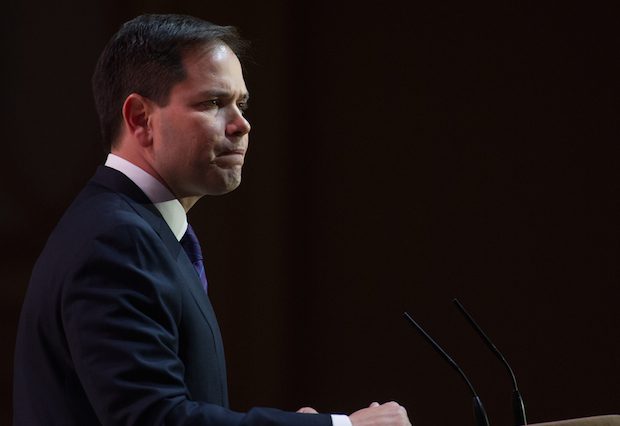Rubio and “Nation-Building”

Marco Rubio’s preferred Iraq policy is getting some attention:
“It’s not nation-building. We are assisting them in building their nation,” Rubio said of his vision for Iraq.
Specifically, Rubio said that he thinks the U.S. has a responsibility to “help them build a functional government that can actually meet the needs of their people over the short and long term.” How that differs from a policy of “nation-building” is unclear at best, since it would seem to be the definition of what past “nation-building” missions have tried to do. But Rubio’s statement raises three more important questions: why does he think building a “functional government” in Iraq is still a U.S. responsibility in 2015, how long does he think the U.S. will have this responsibility, and why does he think the U.S. knows how to do any of this?
The U.S. experience in Iraq between 2003 and 2011 is strong evidence that the U.S. doesn’t know how to “help them build a functional government.” If the U.S. is incapable of fulfilling the responsibility that it supposedly has, there would seem to be no point in making the attempt. The U.S. owes Iraq far more than it can ever repay, but there is no reason to assume that it is doing Iraq any favors by attempting to repay that debt when it has had such an awful track record in the country.
Rubio also objects to past U.S. support for Maliki, which he portrays simply as a failing of the current administration, but the “rallying around” Maliki that he cites as a cause of Sunni alienation was a bipartisan, consensus affair dating back nine years. For years, Maliki was celebrated in Washington as a “secular” nationalist leader, and his sectarianism and semi-authoritarian practices were whitewashed or ignored. Maliki came to power and remained in power for as long as he did in no small part because the U.S. thought that he could create and run a “functional government” in Iraq, and he was already behaving in an abusive and sectarian fashion while the U.S. had a large military presence in the country. Rubio’s suggestion that a continued U.S. presence would have prevented this is unfounded.
Rubio’s statement has come in for a fair amount of mockery because it seems so obvious that he is contradicting himself in the same breath, but this is not really all that different from his other rhetorical sleights-of-hand. He disavows a label or a phrase that he knows to be politically radioactive, but he continues to endorse the policies associated with it. He has eschewed the hawkish label and called it “outdated,” but on every issue can be relied on to take a very hawkish position. When he spoke at the Council on Foreign Relations last month, he claimed that he didn’t believe that the U.S. should be the “world’s policeman,” but the substance of everything else he said that day and during his Senate career tells us that this is exactly what he thinks the U.S. role in the world should be. No doubt he would want to call it something else, and he would probably describe it as exercising “leadership,” but policing the world and taking sides in various foreign conflicts are what Rubio thinks the U.S. should be doing. Rubio wants the U.S. to be the “world’s policeman,” but doesn’t want to be stuck with the baggage of that phrase, and in the same way he thinks the U.S. should keep trying to “nation-build” in Iraq without using the name.
Comments